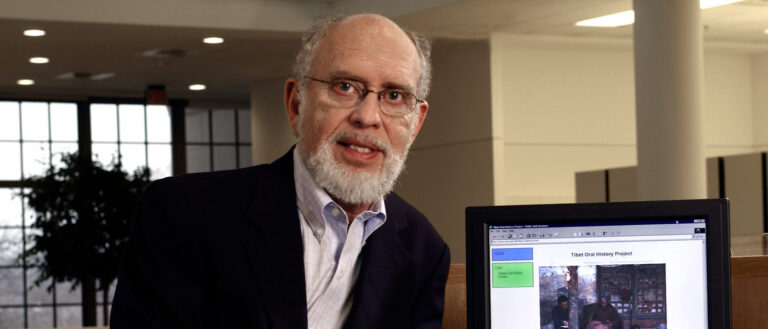Melvyn C. Goldstein, the John Reynolds Harkness Professor of Anthropology and co-director of the Center for Research on Tibet at CWRU, has been awarded the Association for Asian Studies’ 2022 E. Gene Smith Inner Asia Book Prize for his 2019 book: A History of Modern Tibet, Volume 4: In the Eye of the Storm, 1957-1959 (University of California Press).
Named to honor the distinguished scholar of Tibet, Mongolia and other areas of Inner Asia, the E. Gene Smith Book Prize, offered biennially, honors outstanding and innovative scholarship across discipline and country of specialization for a book on Inner Asia.
The fourth volume of Goldstein’s History of Modern Tibet series provides new perspectives on Sino-Tibetan history during the period leading to the Tibetan Uprising of 1959. The volume also reassesses issues that have been widely misunderstood as well as stereotypes and misrepresentations in the popular realm and in academic literature (such as in Mao’s policies on Tibet).
The book also draws on important new Chinese government documents, published and unpublished memoirs, new biographies and a large corpus of in-depth, specially collected political interviews to reexamine the events that produced the March 10th uprising and the demise of Tibet’s famous Buddhist civilization. The result is a heavily documented analysis that presents a nuanced and balanced account of the principal players and their policies during the critical final two years of Sino-Tibetan relations under the Seventeen-Point Agreement of 1951.
The award statement from the Association for Asian Studies (ASS) states:
“…Goldstein ably demonstrates that the decisions undertaken by the major political actors of the era, including the Dalai Lama, Mao Zedong, and many others, ultimately generated an outcome that no one really wanted. Goldstein’s meticulous handling of an impressive range of actors in this distressing drama, including Tibetans, Chinese, and Americans, leaves the reader and the specialist not only with much to think about, but also with many new available materials to explore further. The author’s nuanced and unprejudiced descriptions and analyses rely on an unprecedented wealth of primary sources in multiple languages (primarily Tibetan and Chinese), both oral and written, collected over many years, and overcoming countless challenges, many of them also available online through the Tibetan Oral History Archive Project. With this volume, Goldstein has achieved a remarkable feat.”
About AAS
AAS is a scholarly, non-political, nonprofit professional association open to all persons interested in Asia and the study of Asia. With approximately 5,000 members worldwide, representing all the regions and countries of Asia and all academic disciplines, the AAS is the largest organization of its kind.

